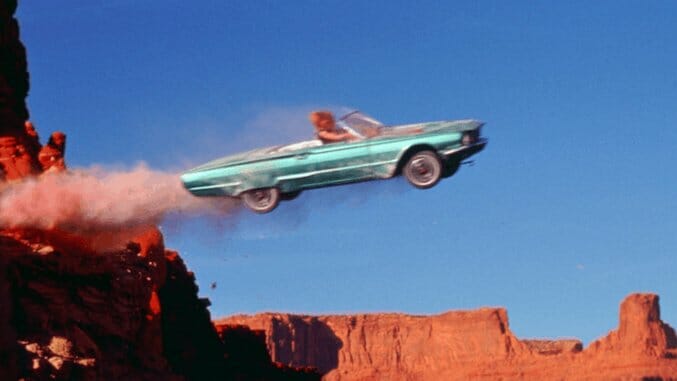In Off the Cliff, Becky Aikman Talks Thelma & Louise While Tackling Hollywood’s Misogyny

What a brilliant, heedless, daring bit of improvidence it took to make the legendary Thelma & Louise. In her book Off the Cliff, Becky Aikman tells the long story behind 1991’s surprise feminist hit. The thing was a dream; it began as the vision of disgruntled music video director Callie Khouri, dwelt in development hell, was discovered, forgotten, rediscovered, passed around and recast before it made history.
In short, Off the Cliff it is the tale of four wheels, two leads and the hassle it took to get them on the screen. Aikman’s book is not just a tell-all, but a tell-why. The author’s fondness for the dusty, gritty parts of filmmaking jives perfectly with the film’s eye for the sandblasted parts of American life. If L.A. had been a just place, a noble place, if Khouri hadn’t spent years watching ‘80s hair bands grope dancers, characters Thelma and Louise would never have seen the light of day. The duo are iconic, but how does one become an icon? By smashing other icons.
 Aikman’s saga—and it is that—is a hybrid animal, a beast of two parts. One half is the conventional cinematic behind-the-scenes-history we’ve all read before. This producer has this color eyes, this financier had this money available, this location was accessible, here’s what you would have seen during the casting process. None of which is boring, but all of which is expected.
Aikman’s saga—and it is that—is a hybrid animal, a beast of two parts. One half is the conventional cinematic behind-the-scenes-history we’ve all read before. This producer has this color eyes, this financier had this money available, this location was accessible, here’s what you would have seen during the casting process. None of which is boring, but all of which is expected.
But the other half of the story, what Thelma & Louise really meant, is the real draw of Aikman’s book. It’s the tale of American feminism, and in particular, the story of how women are mistreated in Hollywood. Anybody with two ears and common sense understands Hollywood’s misogyny. You could call it the industry’s longest-lasting tradition, after self-admiration. Ask any actor or close-watcher of the movie business: they’ll tell you stories to make you want to shed your skin. Aikman’s gift is to take the sexism of Los Angeles and quietly, without fanfare, make the perpetual privileging of male filmmaking a concrete fact for the reader.
-

-

-

-

-

-

-

-

-

-

-

-

-

-

-

-

-

-

-

-

-

-

-

-

-

-

-

-

-

-

-

-

-

-

-

-

-

-

-

-








































